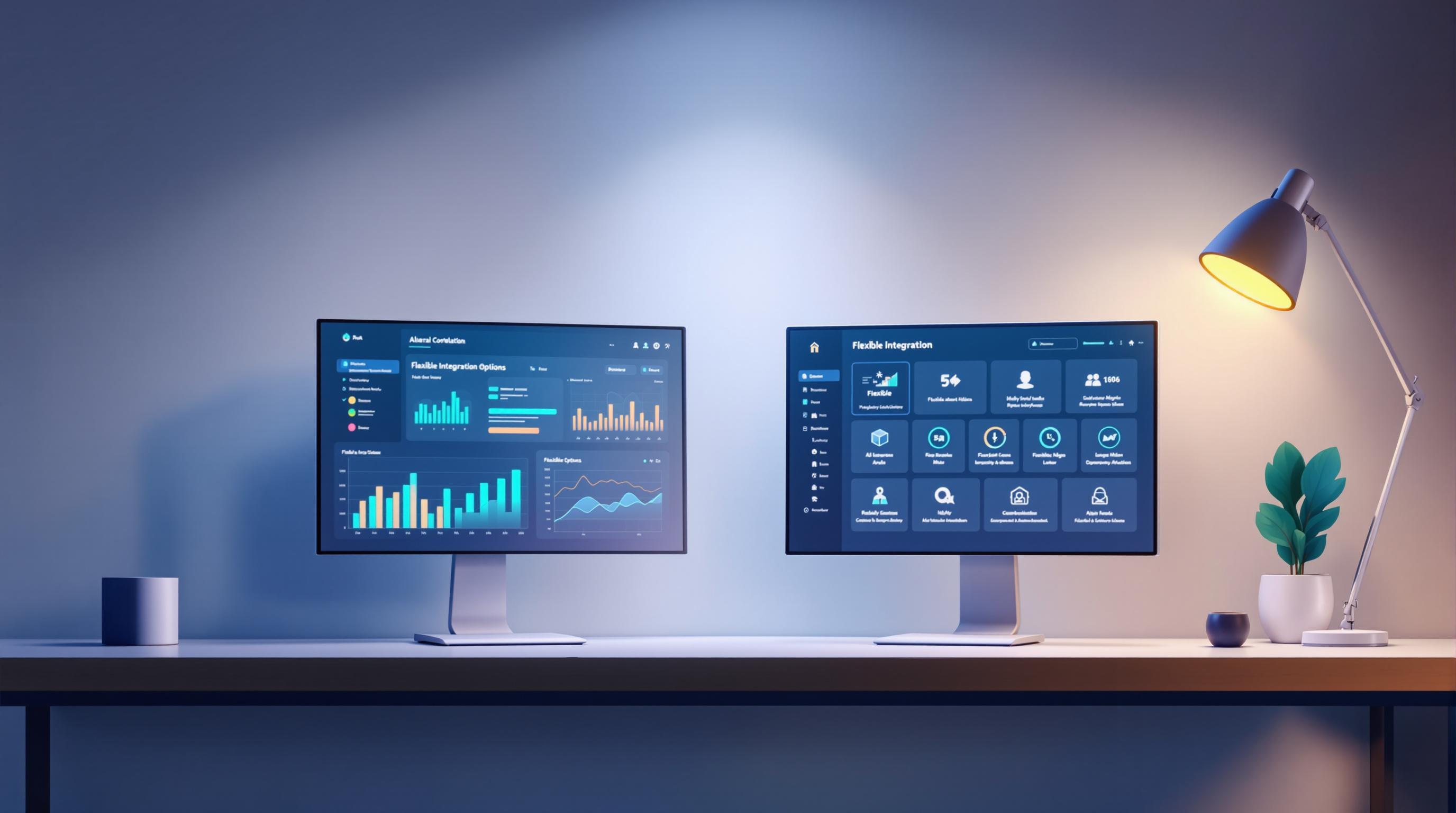Looking for cheaper options than Datadog? Here's a quick rundown of 6 alternatives:
- Prometheus - Free, open-source
- SigNoz - Free, open-source
- New Relic - Paid, easy to use
- Dynatrace - Paid, AI-powered
- Sumo Logic - Paid, cloud-based
- Amazon CloudWatch - Paid, for AWS users
Quick Comparison:
| Tool | Cost | Best For | Key Feature |
|---|---|---|---|
| Prometheus | Free | Customization | Flexible querying |
| SigNoz | Free | Easy setup | OpenTelemetry support |
| New Relic | Paid | Feature-rich | All-in-one monitoring |
| Dynatrace | Paid | Full-stack | AI-driven insights |
| Sumo Logic | Paid | Cloud apps | Log management |
| CloudWatch | Paid | AWS users | AWS integration |
Choose based on your budget, system size, and specific needs. Free options offer more flexibility but require more setup. Paid tools are easier to use but can get expensive for large deployments.
Related video from YouTube
1. Prometheus
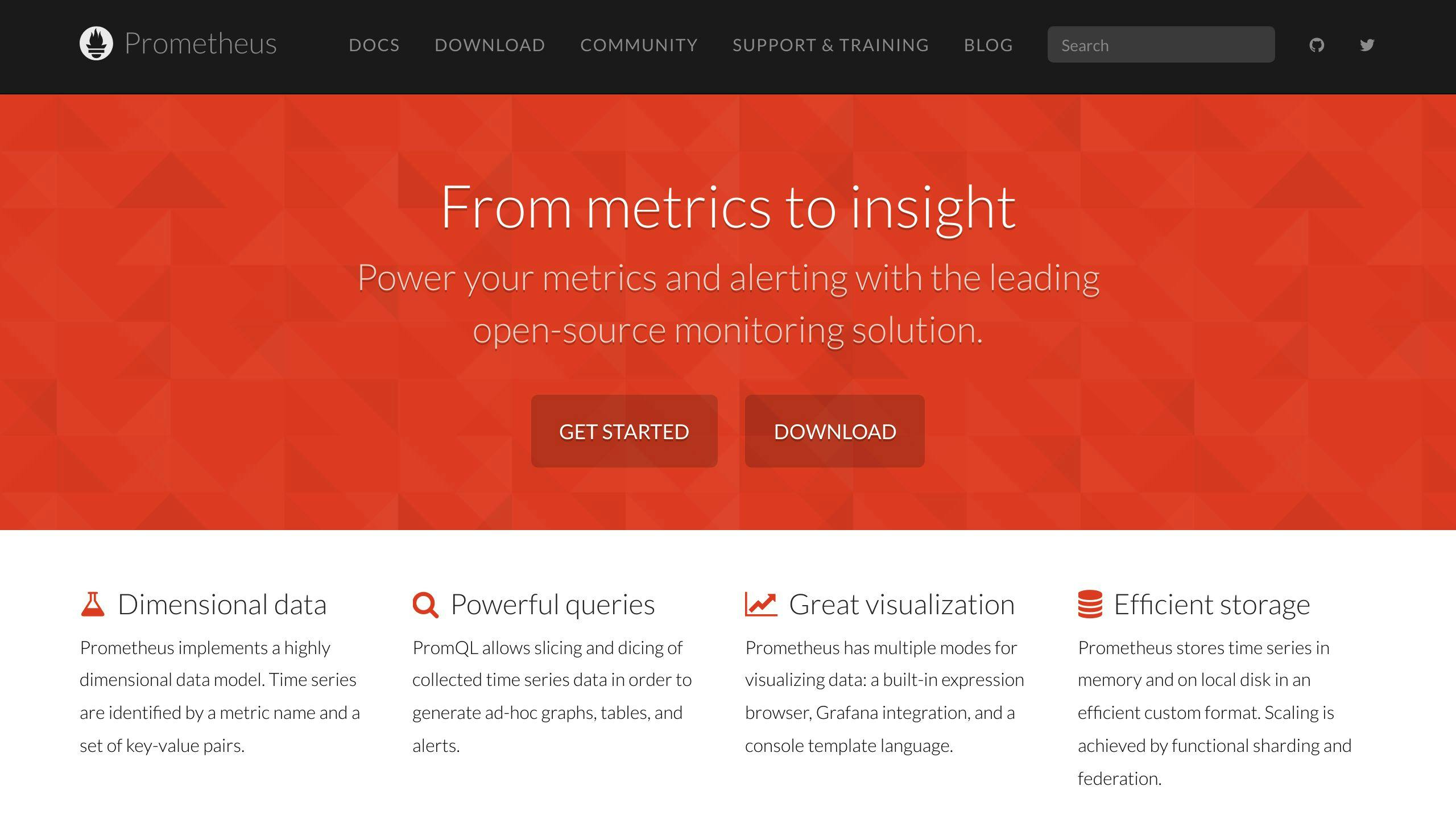
Cost
Prometheus is free to use because it's open-source. This makes it cheaper than Datadog, which charges for many features. Small and medium-sized companies or new startups can save money by using Prometheus.
Features
Prometheus offers these key features:
| Feature | Description |
|---|---|
| Data model | Flexible querying with multi-dimensional data |
| Query language | PromQL for analyzing time-series data |
| Alerts | Rules to spot issues and send notices |
| Visualization | Works with tools like Grafana |
| Container support | Good for systems like Kubernetes |
Prometheus is built to be reliable and handle growth, making it good for big and spread-out systems.
Scalability
Prometheus can:
- Handle lots of data
- Grow sideways (add more machines)
- Use multiple instances together
- Give a full view of the system
This makes it work well for large companies with complex setups.
Integration
Prometheus fits well with other tools:
| Tool | Integration Benefit |
|---|---|
| Grafana | Better data display |
| Kubernetes | Good for container setups |
| Docker | Easy to use with containers |
| Various exporters | Can watch many different systems |
In short, Prometheus is a free option instead of Datadog. It has many features, can grow with your needs, and works well with other tools. Many companies, big and small, like using it because it's free and flexible.
2. SigNoz
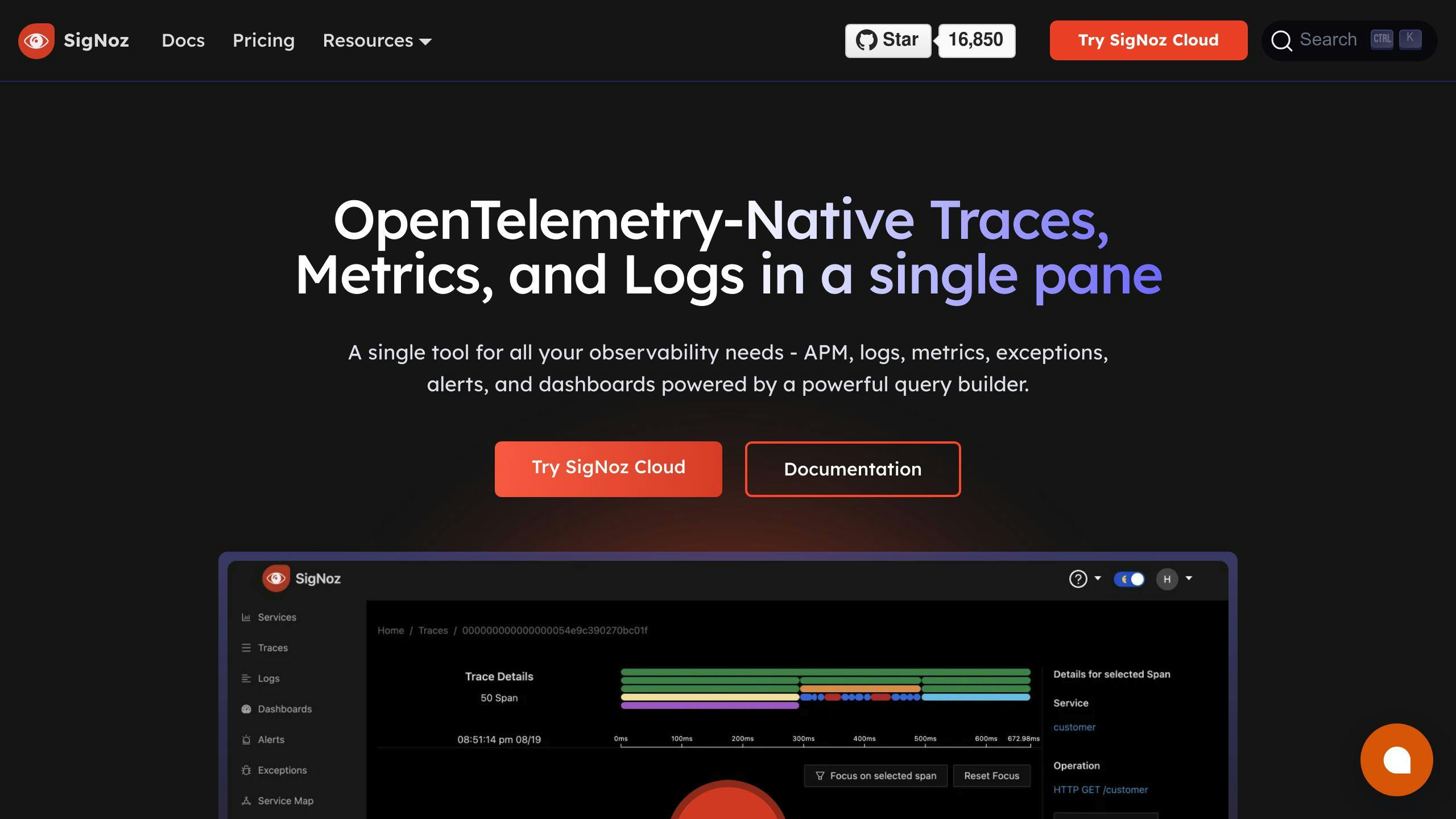
SigNoz is a free, open-source tool that helps track how well software is working. It's a good choice for companies looking for a cheaper option than Datadog.
Cost
SigNoz is free to use. There's also a paid version for big companies with special needs, which can be cheaper than Datadog.
Features
SigNoz can do many things:
| Feature | Description |
|---|---|
| Ready-made charts | Shows how fast and well your software is working |
| Easy problem-finding | Helps you quickly see what's wrong |
| Custom views | Lets you look at data in different ways |
| Log linking | Connects error messages to help fix problems faster |
| OpenTelemetry support | Works well with this popular tracking system |
Scalability
SigNoz can handle lots of data from big software systems. It's easy to set up and use, like a service you'd pay for online.
Integration
SigNoz works well with other tools:
| Tool | How it helps |
|---|---|
| OpenTelemetry | Makes it easy to track your software |
| Jaeger | Helps see how different parts of your software work together |
| Other systems | Can be changed to work with what you already use |
In short, SigNoz is a good, cheap option instead of Datadog. It can do a lot and works well for many different companies.
3. New Relic
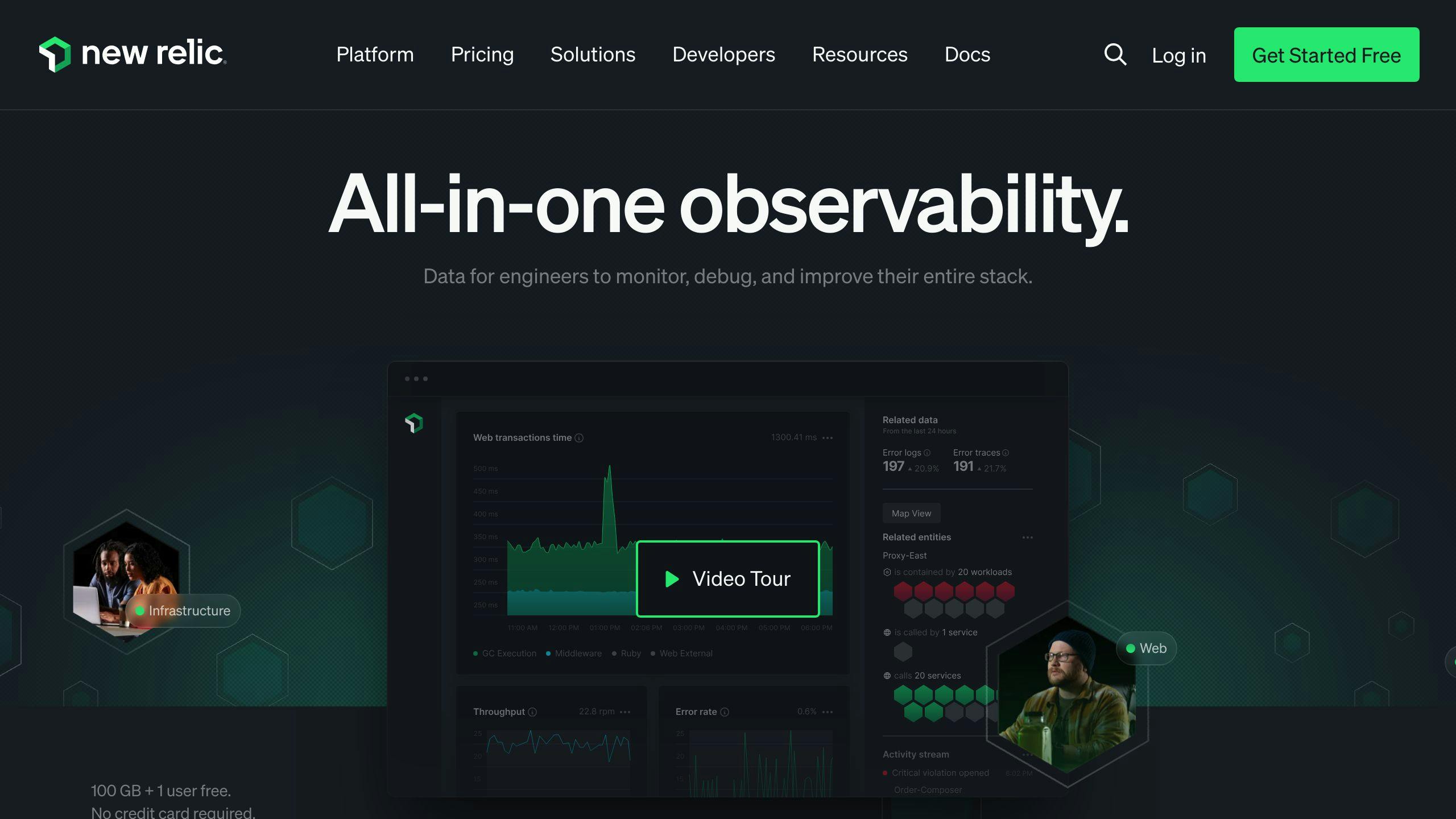
New Relic is a good option instead of Datadog. It helps you watch how well your software is working.
Cost
New Relic has a free plan that gives you:
- One user who can use everything
- 100GB of data
If you need more, you pay:
- $0.30 for each GB over 100GB
- Extra for more users
Features
New Relic can do many things:
| What it does | How it helps |
|---|---|
| Watch apps | Finds slow parts in your software |
| Check websites | Sees how people use your site |
| Look at phone apps | Makes sure phone apps work well |
| Test like a user | Checks if your site works right |
| Watch small programs | Helps small, quick programs run better |
| Check computers | Makes sure your computers are working |
| Look at error messages | Helps you find and fix problems |
| Fix issues fast | Tells you when something's wrong |
Growth
New Relic can handle a lot of information. It works in the cloud, so it can grow as you need it to.
Working with other tools
New Relic fits with many other tools you might use. This makes it easy to add to what you already have.
4. Dynatrace

Dynatrace is another option instead of Datadog. It uses AI to watch over your whole software system.
Cost
Dynatrace's price depends on how much memory your computers use. They assume 8 GB of memory for each computer, but this can change based on what you need. You can try Dynatrace for free for 15 days before you buy it.
Features
Dynatrace can do many things:
| Feature | What it does |
|---|---|
| App watching | Checks how well your software works |
| User watching | Sees how people use your software |
| Computer watching | Makes sure your computers are working right |
| Log checking | Looks at error messages |
| User experience checking | Makes sure people like using your software |
| AI help | Uses smart computer thinking to find and fix problems |
| All-in-one system | Keeps all your information in one place |
Dynatrace looks at everything from how users feel to how your computers are working. It can find and fix problems on its own, which helps keep your software running well.
Growth
Dynatrace can handle big systems and grow as you need more. It works well for companies with lots of different computer parts.
Working with other tools
Dynatrace fits with many other tools you might use:
| Type of tool | Examples |
|---|---|
| Cloud systems | Like Amazon Web Services or Google Cloud |
| Container tools | Like Docker or Kubernetes |
| Work tools | Like the ones developers use |
It can share information easily with these other tools, which helps teams work together better.
In short, Dynatrace is a good choice instead of Datadog. It can do a lot, grow with your needs, and work well with other tools you use.
sbb-itb-9890dba
5. Sumo Logic
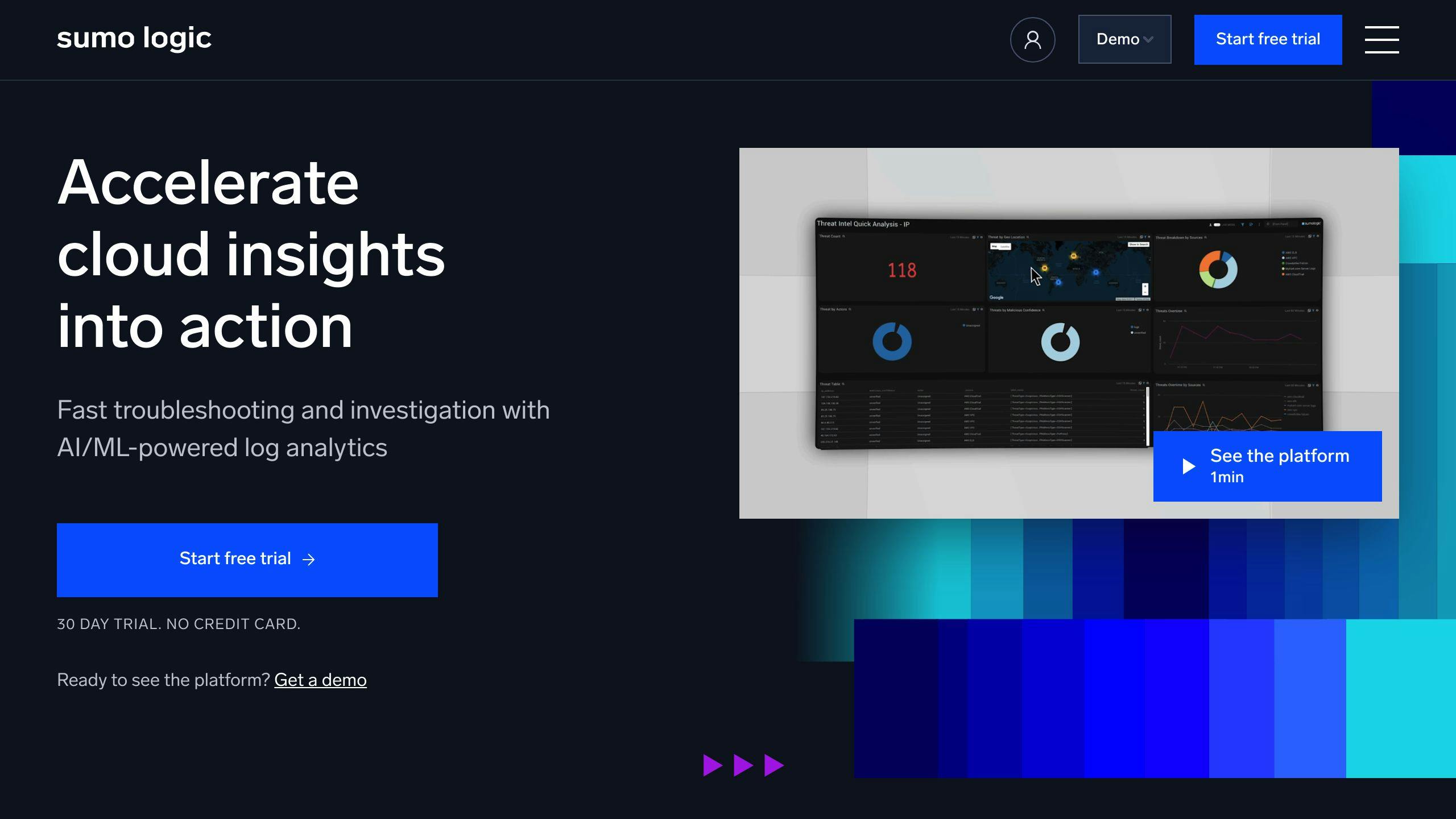
Sumo Logic is a cheaper option than Datadog. It helps watch over cloud-based software and find problems quickly.
Cost
Sumo Logic has:
- A free plan with some features
- A paid plan where you pay based on how much data you use
- Prices that work for small and big companies
Features
Sumo Logic can do many things:
| Feature | What it does |
|---|---|
| Log checking | Looks at error messages from different places |
| Computer watching | Checks how well servers and apps are working |
| App checking | Sees how well apps work and if users like them |
| Safety checking | Finds and fixes safety problems quickly |
| Works with other tools | Fits with things like AWS, Azure, and Google Cloud |
Growth
Sumo Logic can:
- Handle lots of information
- Grow as your company gets bigger
- Keep working even if something goes wrong
Working with other tools
Sumo Logic works well with:
- Cloud systems
- Tools that help run containers
- Tools that developers use
This helps companies use what they already have and makes work easier.
6. Amazon CloudWatch

Amazon CloudWatch is a tool from AWS that helps you keep an eye on your AWS resources and apps. It lets you gather and check data, logs, and events, and set up alerts when things go wrong.
Cost
CloudWatch has a free tier that gives you:
| Free Tier Includes | Amount |
|---|---|
| Metrics | 10 |
| Alarms | 10 |
| API requests | 1 million per month |
After that, you pay based on how much you use. The price can go up fast for big apps.
Features
CloudWatch can do many things to help watch over AWS resources and apps:
| Feature | What it does |
|---|---|
| Metrics | Collects data like CPU use and error rates |
| Logs | Stores and checks log data |
| Alarms | Tells you when something's wrong |
| Events | Responds to changes in real-time |
Growth
CloudWatch can handle your app as it gets bigger. It can deal with lots of data, logs, and events, and keeps your info safe and always available.
Working with other tools
CloudWatch fits well with other AWS tools like EC2, RDS, and Lambda. It also has ways to connect with your own apps and services.
Strengths and Weaknesses
Let's look at the good and bad points of each Datadog alternative:
| Tool | Good Points | Bad Points |
|---|---|---|
| Prometheus | - Free and open-source - Lots of community help - Works with many data types - Can handle big systems |
- Hard to learn - Needs lots of setup - Fewer ready-to-use features |
| SigNoz | - Free and open-source - Easy to set up - Works with many data types - Can handle big systems |
- Less community help - Fewer features than paid options |
| New Relic | - Easy to use - Works with many data types - Can handle big systems - Lots of community help |
- Can be expensive for big setups - Less flexible than free options |
| Dynatrace | - Easy to use - Works with many data types - Can handle big systems - Lots of community help |
- Can be expensive for big setups - Less flexible than free options |
| Sumo Logic | - Easy to use - Works with many data types - Can handle big systems - Lots of community help |
- Can be expensive for big setups - Less flexible than free options |
| Amazon CloudWatch | - Works well with AWS - Can handle big systems - Good for small to medium setups - Lots of community help |
- Less flexible than free options - Can be expensive for big setups - Not great for non-AWS systems |
When picking a cheaper option than Datadog, think about what you need most. If you want to change things a lot, try Prometheus or SigNoz. If you want something easy to use with lots of features, look at New Relic, Dynatrace, or Sumo Logic. If you use AWS a lot, Amazon CloudWatch might be best for you.
Summary
To wrap up, picking a cheaper option instead of Datadog depends on what you need. Here's a quick look at the main choices:
| Tool | Type | Best for |
|---|---|---|
| Prometheus | Free, open-source | Companies that want to change things a lot |
| SigNoz | Free, open-source | Easy setup, good for big systems |
| New Relic | Paid, easy to use | Lots of features, good help |
| Dynatrace | Paid, AI-powered | Watching whole systems |
| Sumo Logic | Paid, cloud-based | Good for cloud software |
| Amazon CloudWatch | Paid, AWS tool | Best for AWS users |
When choosing, think about:
- How big your system is
- How much you can change things
- How much help you can get
Each tool has good and bad points. Look at what you need most and pick the one that fits best.
Remember:
- Free tools like Prometheus and SigNoz let you change more but need more work
- Paid tools like New Relic and Dynatrace are easier to use but cost more
- If you use AWS a lot, CloudWatch might work best for you
Pick the tool that works best for what you need and how much you can spend.
FAQs
What is open source monitoring system?
Open-source monitoring systems are free tools that help you keep an eye on how your computer systems are working. They let you know when something goes wrong or needs fixing.
These tools can watch different parts of your system:
| What they watch | Examples |
|---|---|
| Servers | How much work your computer is doing |
| Networks | If your internet is working well |
| Cloud systems | Programs that run on the internet |
| Containers | Small packages of software |
| Databases | Where you store information |
| Security | Keeping your system safe |
| Performance | How fast your system is working |
| Websites | How people use your website |
| Apps | Programs you use every day |
